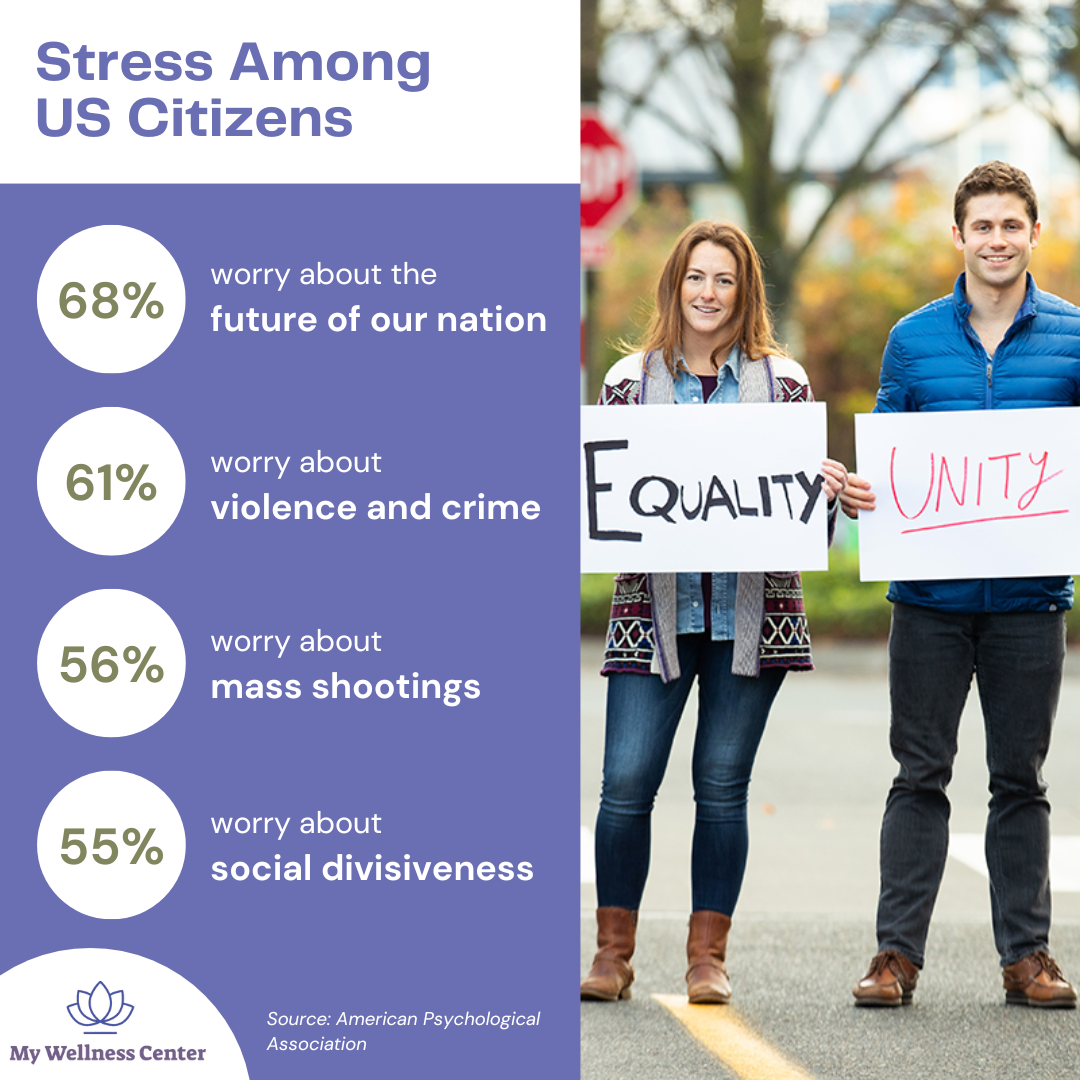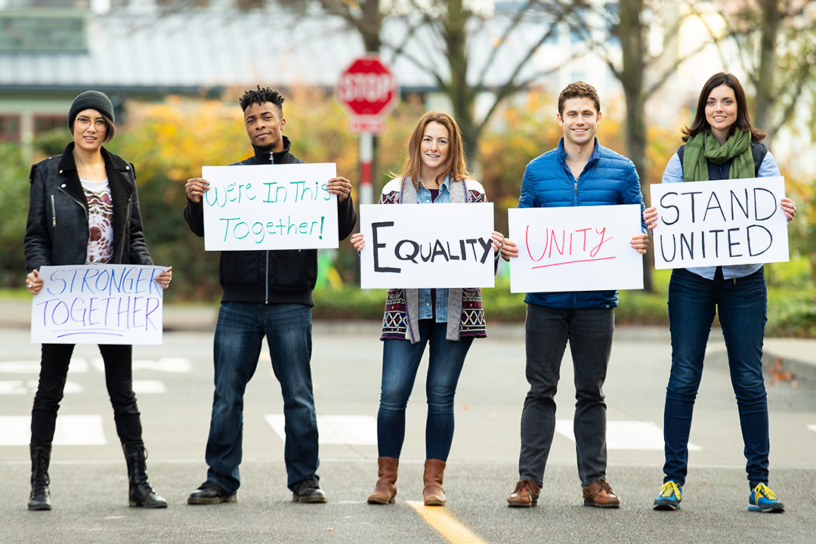Social justice, politics, and mental health rarely go well together.
Between former presidents taking the stand in courtrooms, a constant barrage of news coverage for scandalous political tweets, and a seemingly endless parade of shootings, racially motivated crimes, abortion protests, and a variety of other serious social issues, it’s no wonder people are stressed.
Many are turning to social justice activities like protests, campaign letters, and similar initiatives to fight back—but it’s often not enough. Some are finding that despite their best efforts, they’re struggling to make a serious change in society.
And that only leads to even more serious mental health issues.
Fortunately, therapy can help.
Read our blog to learn more about how politics and mental health rarely go together, and how a thoughtful therapist can help you manage social justice-related stress.
Jump to the section most relevant to you to learn more:
Table of Contents
Stats on Social Justice And Mental Health In America
Social Justice, Social Inequality, And Mental Health
Social Justice And Mental Health Among Patients
Therapy for Social Justice And Politics
Find A Therapist For Social Justice And Politics
Stats on Social Justice And Mental Health In America
The 2023 Stress In America poll from the American Psychological Association found many of the top stressors among US citizens are political- or social justice-related. They include:
- The future of our nation (68% of respondents said it was a significant source of stress)
- Violence and crime (61%)
- Mass shootings (56%)
- Social divisiveness (55%)

Across the country, US citizens have connected online for mass demonstrations—some of which have become record-breaking protests. They include:
- George Floyd Protests in 2020 for racial equality and justice (Approximately 20 million people attended nationwide)
- Women’s March in 2017 for women’s equality and protection (Approximately 3-5 million people attended nationwide)
- March for Our Lives in 2018 to advocate for increased gun control and reduce school shootings (Approximately 2 million people attended nationwide)
More recently, we’ve seen massive reactions against the wars in Ukraine and Palestine. In fact, the Israel-Palestine conflict has already generated two significant marches in Washington, D.C.:
- The Free Palestine March (100,000-300,000 in attendance)
- The March for Israel (100,000-300,000 in attendance)
If history repeats itself, we’ll likely continue to see even more social justice movements across the United States, and that makes therapy and improved mental health even more important.
Social Justice, Social Inequality, And Mental Health
While social activism is directly correlated with heightened stress levels, so is social inequality. The link between social inequality and mental health is well-documented, with numerous studies showing that those who face greater social disadvantages often experience higher levels of mental health disorders.
Sadly, experiencing social inequality can lead to increased stress, anxiety, and depression. The feeling of being treated unfairly or being deprived of opportunities that others have can erode a person’s sense of self-worth and agency, leading to significant psychological distress, like anxiety, substance abuse, and more.
For instance, Inequality.org reports that persistent wealth disparities, reductions in community life, and increases in violence are directly linked to poorer mental health, especially among minority groups who face systemic barriers to equality.
With that in mind, it’s essential for both activists and victims to explore mental health options.
Social Justice And Mental Health Among Patients
Within our offices, we see a multitude of patients for social justice and mental health.
Simply put, social justice and politics are stressful, especially among individuals who experience heightened empathy for other people. And in a world where the latest heartbreaking news stories are plastered all over social media, TV, and the internet, many people find it difficult to escape from these social issues.
We frequently talk to patients who are concerned about:
- The LGBTQIA+ community
- Minority communities
- Wars
- Addiction, drug use, and the U.S. drug epidemic
- Politics and the perceived lack of compassion among politicians
- The lopsided distribution of wealth both nationally and globally
While many people believe strongly in a specific cause or effort, others are equally frustrated by how powerless they feel to create change; marching and signing petitions only goes so far.
This perceived shortcoming can then create a cycle of shame and discouragement, leading to even greater stress and mental health challenges.
Therapy for Social Justice And Politics
Here are some of the most common therapy techniques we explore related to social justice issues:
1. Acceptance and Commitment Therapy. Acceptance and Commitment Therapy encourages individuals to first accept their thoughts and emotions, then commit to positive-outcome actions. So, instead of yelling at the TV or stressing after reading a frustrating newspaper article, one could call a friend to discuss the news or immediately write to their local politician.
2. Helping people get to the core of their Why. When people better understand the motivations and passions behind their social justice efforts, they can better contend with the emotions and thoughts that come along with them.
In some cases, we learn that social justice isn’t just about social justice. For some people, social engagement is a way of being heard and validated—especially if they’re not receiving that sort of love and respect at home or within their own communities.
In other cases, it could be caused by the patient avoiding a significant problem in their life by focusing on a serious social issue.
No matter what the root cause is, understanding one’s why can lead to a greater understanding of themselves.
3. Helping people become the change they want to see. Gandhi is famously quoted with saying, “Be the change you want to see in the world.” The meaning, of course, is to take action for what you believe in.
But for many people, getting started is half the battle. In therapy, an individual can best identify their options for having an impact in the community, especially around the issues that are most important to them.
4. Couples Counseling. Disagreements over politics or social justice issues can drive a powerful, volatile wedge between otherwise loving individuals.
Therapy can give them the opportunity to discuss their differences in a safe, supportive, and constructive environment, leading to a deeper understanding of each other’s beliefs and priorities. Therapy can be particularly useful for older couples interested in avoiding “gray divorce.”
Find A Therapist For Social Justice And Politics
If you’re looking for a therapist to assist with stress induced by social justice issues or politics, contact us. We’ll connect you with a thoughtful therapist who’s ready to help you explore solutions.

